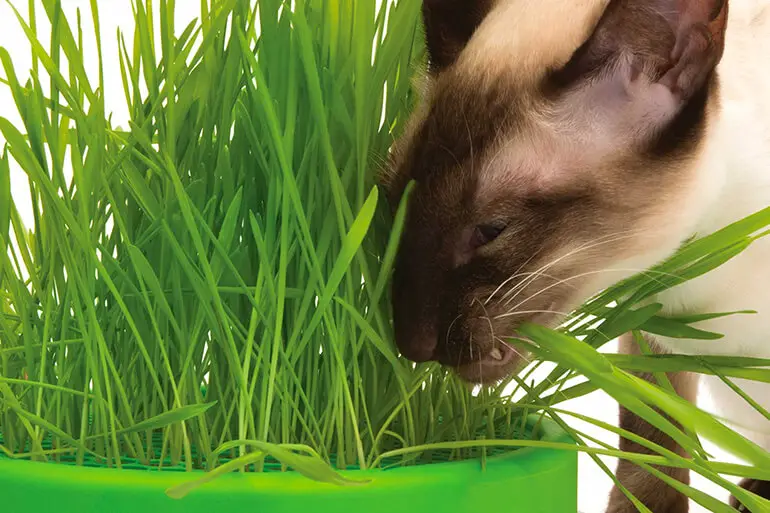Many people wonder whether cat grass is recommended for their four-legged friends. The answer is yes. The fact that cat grass is good for cats is not far-fetched. It has a positive effect on the health of your fur nose because it helps to cope with swallowed hair. In addition, its soft stalks prevent the house tiger from nibbling on the plants in the house.
Cat Grass for Cats
- Cat grass is one of the healthy plants for cats. It helps move indigestible hairballs out of the gastrointestinal tract.
- The plant reduces the risk of constipation.
- The different varieties are rich in nutrients.
- The grass is available in different varieties in supermarkets, hardware stores, and pet shops.
- Cat grass care is not very demanding.
What is Cat Grass?

Cat grass is an undemanding plant for house tigers that you can grow yourself with seeds. If you want, you can also buy ready-made cat grass. The grass promotes digestion and tastes good to the four-legged friend. It is also advantageous that it is well tolerated and prevents constipation. Unlike certain other plants, you don’t have to worry about your cat’s health here.
Tip: With some cat grass in the house, you can keep cats and dogs from gnawing.
Cat grass: where can I buy cat grass?
There is a large selection of different varieties in animal retailers. Cat grass is offered in pet stores. In supermarkets, the supply mostly depends on the season. Therefore, it makes sense to go to a specialist market.
Tip: You can buy cat grass seeds cheaply on the Internet. This way you can grow your own weed and save money in the process.
Cat grass: when is feeding possible?
The special grass can be fed when the mini tiger begins to consume solid food. You can start giving the food supplement individually. If you are unsure, it is best to contact the veterinarian.
Cat grass: how often does it make sense to give it?
If you want, the grass can be made available permanently. If the plant is less likely to be accepted, move it temporarily out of reach. This will make the cat interested in the grass again.
Cat Grass: Effects and Side Effects?
Since the plant is used to cleanse indigestible hairballs from the stomach, it induces vomiting. This cleanses the organ. Sometimes blades of grass get stuck in the throat as a result of spitting. This triggers the gag reflex and the fur nose vomits again. Excessive use of cat grass can therefore lead to fluid loss. It is therefore important to provide enough fresh water and limit the use of grass. With sharp-edged types of grass, it is also possible that the mini tiger will be injured.
Tip: Oat grass is a type of cat grass that is less spicy and well-tolerated. For this reason, it is a good addition to dry and/or wet food.
These are the Cat Grass Alternatives
If your four-legged friend does not like grass, there are other plants and foods as alternatives. Malt paste is a good digestive aid, often recommended by veterinarians. The Golliwogg plant, which is actually intended for reptiles and rodents, is also good for cats. The high water and nutrient content of the plant is beneficial.
That is Why We Recommend Feeding Cat Grass
The grass frees the darling from hairballs by stimulating the excretion. In addition, the plant contains important nutrients that have a positive effect on health. The most valuable ingredients of oat, wheat, and barley grass include:
- selenium
- magnesium
- calcium
- phosphorus
- zinc
- copper
- potassium
- sodium
Grow Cat Grass Yourself
Anyone planning to plant oat grass needs only a few utensils:
- Seeds of the desired variety of grass (wheat, barley, or oats) for planting;
- Earth or sand to attract the seeds;
- Pots for growing the plant;
- Saucer for the pot to water the grass from below and thus prevent mold growth.

